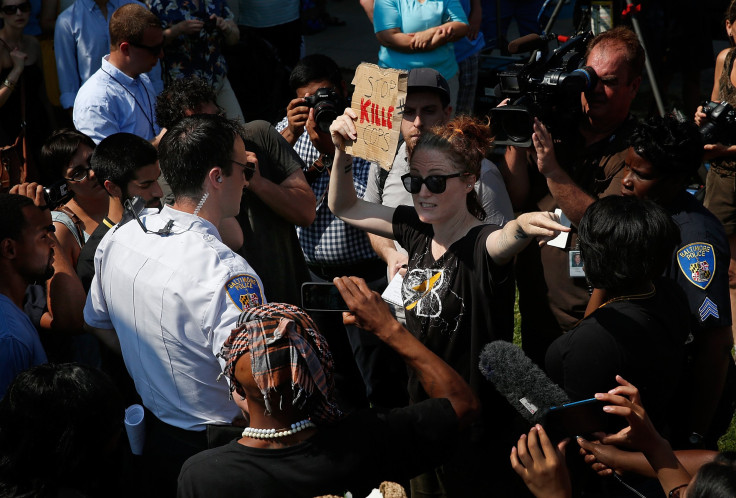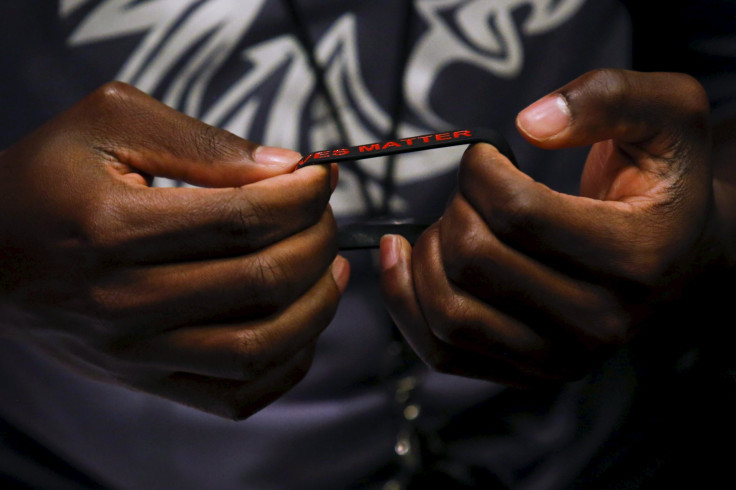Election 2016 And Black Lives Matter: What Have The Candidates Said?

It's been just over a year since the gunshots that started a movement. After Michael Brown was shot in Ferguson, Missouri, protests and riots ensued. As time went on, the stories of more unarmed black men getting shot by police began to pour forward, a deluge that birthed the Black Lives Matter movement that has only pushed itself more prominently into public view.
The movement has made its way onto the stages of 2016 presidential hopefuls recently, and the reactions from those hoping to inhabit the White House have been varied. On Friday, Wisconsin Gov. Scott Walker, a Republican, dismissed the movement and the larger issue posed by the activists, saying the he wanted to talk about "things that matter" and portrayed the movement as an amalgam (notably, he was the sole Republican candidate to receive a Black Lives Matter question in the first Republican debate). Activists have interrupted campaign events across the country: So, what do the top three candidates -- on either side -- think of the movement?

Donald Trump
Donald Trump is more concerned with letting people know that he's not politically correct than really addressing the concerns, or so it seems. The most he's really done to talk about it has been to chastise Democratic candidate and former Maryland Governor Martin O'Malley for apologizing after telling a crowd that "all lives matter" when Black Lives Matter organizers interrupted an event of his in Phoenix.
"I thought when O'Malley made the statement that black lives matter, then he said white lives matter, all lives matter. And then he apologized like a little baby, like a disgusting little weak pathetic baby," he said during a recent Fox News interview. "And that's the problem with our country... How can you apologize when you say black lives matter, which is true. White lives matter, which is true. All lives matter, which is true. What is there to apologize for?"
Jeb Bush
Bush is in the same boat as Trump when it comes to apologizing for saying that all lives matter. He's a bit of a policy -oriented guy, though, so when he was asked earlier this month in Las Vegas to speak about racial injustice in the United States, he said, "we have serious problems and these problems have gotten worse in the last few years. Communities, people no longer trust the basic institutions in our society that they need to trust to create, to make things work.
This was after Black Lives Matter protesters began chanting at the end of his event -- and his supporters began chanting back that "white lives matter" and "all lives matter."
Ben Carson
Carson deserves a mention in this list for two reasons: one is that he's the only black candidate in the race and the other is that he has managed to find himself in third place in the Republican field behind Bush and Trump in an average of national polls (Walker is just behind him in fourth). Carson hasn't concerned himself quite as much with asserting that white lives matter. Instead, he's used questions about the movement to pivot to talking about abortion.
“I don’t know anybody who doesn’t think black lives matter — I mean that’s a given,” Carson said this week in Phoenix. “I would add the word ‘all.’ All black lives matter, including the ones being exterminated by abortionists and including the ones being murdered in our major cities. We’ve gotten to the point where homicide is the number one cause of death for young black males in our cities. That makes no sense. We need to be talking about all of it.
... and now the Democrats.
Hillary Clinton
At a campaign event recently, the former secretary of state met with a group of activists privately to hear them out and to discuss the issue. She was asked to bare her soul by the activists. "How do you actually feel that's different than you did before?" activist Julius Jones asked after pointing out legislation signed into law by her husband, former President Bill Clinton, that increased the incarceration rate for small drug offenses, especially black people. Clinton refused to do so, choosing instead to take a more measured and practical approach to her answer.
“I don’t believe you change hearts. I believe you change laws, you change allocation of resources, you change the way systems operates," she said after discussing her advocacy in the past during the civil rights movement. She said that the movement needs specific policy goals and a plan. "That’s what I’m trying to put together in a way that I can explain it, and I can sell it — because in politics, if you can’t explain it and you can’t sell it, it stays on the shelf."
Bernie Sanders
Sanders has been interrupted a couple of times by Black Lives Matter activists, and his response has focused even less on the soul of things than that of Clinton. While emotions and tensions run high around the issue, Sanders has provided policy solutions that aren't exactly warm and cuddly, regardless of their merit. He sees the problem as one of income inequality, and said that equalizing the wealth of blacks and whites is the way to address racial inequality head on.
Last month, he was interrupted by Black Lives Matter activists who demanded that he (and, separately, O'Malley) commit to concrete actions for racial justice. Sanders seemed upset with the interaction, and responded in a way that Vox described as defensive and cranky: "I've spent 50 years of my life fighting for civil rights. If you don't want me to be here, that's okay." He has since been interrupted during a campaign event in Seattle.
Martin O'Malley
O'Malley is hoping to convey empathy for the movement, and say that he understands "the tremendous passion, commitment and feeling and depth of feeling that all of us should be attaching to this issue." That quote came after a flop on the Phoenix stage last month when he confidently told activists that "all lives matter" only to receive harsh criticism from those who said that it showed he didn't understand the point of the slogan (white lives, the argument goes, obviously matter. When you say "black lives matter," there's an implied "too" at the end.)
O'Malley has a somewhat awkward line to tow here, too. While mayor of Baltimore, where recent riots over the death of Freddie Gray occurred, he implemented policing policies that have been the subject of criticism from those who say that it added to the rising tension between police in the black community there.
© Copyright IBTimes 2024. All rights reserved.












